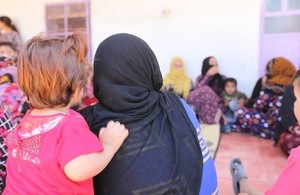New UK aid funding to tackle violence against women and girls in Syria
Baroness Sugg calls for urgent action to prevent gender-based violence in humanitarian crises – as she announces new support to tackle the issue in Syria.

Girls and women at a safe space in Syria run by UNFPA. Picture: UNFPA
Baroness Sugg will today (Friday 24 May) call for urgent action to prevent gender-based violence in humanitarian crises – as she announced new support to tackle the issue in Syria.
The International Development Minister will speak at the UN’s first ever conference on Ending Sexual and Gender-Based Violence (GBV) in Humanitarian Crises in Oslo.
She will say that while internationally agreed commitments to protect women and girls have been made, meeting them should be a priority right from the start of humanitarian crises.
The new UK aid funding will aim to prevent violence against women and girls in Syria, by tackling its root causes, and provide safe spaces and support for survivors. The programme will also train midwives and medical professionals to treat and care for survivors of sexual violence.
International Development Minister Baroness Sugg will say:
No girl or woman should live in fear, yet one in three women globally experience sexual or physical violence.
In humanitarian crises, this can rise to more than two in three, and even then the evidence tells us that the most dangerous place for women and girls is often within their own homes. However, UK aid research shows that this violence is preventable.
Violence against women exists because gender inequality exists and because society can have damaging assumptions of what it means to be female. Failure to address this problem during crises undermines our humanitarian support for the very people it is designed to help.
While the international community has made strong commitments on gender-based violence in crises, tackling this problem remains underfunded. Minimum standards are not in place and there is a lack of urgency given to preventing violence against women and girls.
Preventing and responding to gender-based violence is everyone’s responsibility.
We need to prioritise the protection of women and girls from the outset of humanitarian responses. We must take a ‘no regrets’ approach to responding to violence. And we need to make sure that women and girls have access to the support they need in crisis settings, including vital sexual and reproductive health services.
We must also stand strongly against the rollback of women’s rights. That’s why I’m proud UK aid will continue to champion, defend and support access to life-saving sexual and reproductive health services for the world’s poorest women and girls and those affected by humanitarian crises.
The UK aid funding announced today will support a UNFPA (United Nations Population Fund) programme.
It will tackle the causes of gender-based violence through community programmes in schools and mosques, which will challenge harmful attitudes towards women that normalise violence, including child marriage and denying women and girls their independence. It will also raise awareness of the physical, social and legal consequences of violence.
Since the beginning of the crisis in 2011 women and girls have made a million visits to UK aid-supported safe spaces in Syria. Here, they can access sexual and reproductive health services, including voluntary contraception and menstrual health products, psychological support, counselling and medical treatment.
Notes to editors:
- The UK is a global leader in efforts to eradicate violence against women and girls (VAWG) in all its forms including intimate partner violence, sexual violence, female genital mutilation (FGM), and child, early and forced marriage.
- The UK is a world-leading investor in research on the prevention of violence against women and girls (VAWG).
- An estimated 26 million women and girls of reproductive age are living in emergency situations. Women and girls are affected disproportionately by conflicts and crises and are at increased risk of all forms of violence, sexually transmitted infections, HIV and unintended pregnancy.
- Humanitarian crises heighten the risk of violence against women and girls, but even during emergencies the most dangerous place for women and girls is often within their own homes. For example, UK aid’s ‘What Works to Prevent Violence’ programme found that in South Sudan, intimate partner violence was the most common form of violence reported by women and girls. It’s critical we tackle the multiple forms of violence women and girls face.
On Syria:
- UK aid is committing £7 million this year to support UNFPA’s humanitarian operations within Syria to reduce the risk of gender-based violence (GBV) for those most affected by the crisis
- This builds on UK aid’s existing support to safe spaces in Syria run by the UNFPA. UK aid and UNFPA’s previous programme (2016-2018) saw UNFPA create 137 women and girls’ safe spaces.
- These non-residential centres are at the centre of UK aid and UNFPA’s strategy to tackle GBV. They serve two purposes:
- to allow survivors to enter into a safe space with others where they may speak openly about their experiences, and
- to provide a gateway to other GBV services, including case management, psychological support and counselling, and referrals to health centres for rape survivors.
ENDS
General media queries (24 hours)
Email [email protected]
Telephone 020 7023 0600
If you have an urgent media query, please email the DFID Media Team on [email protected] in the first instance and we will respond as soon as possible.